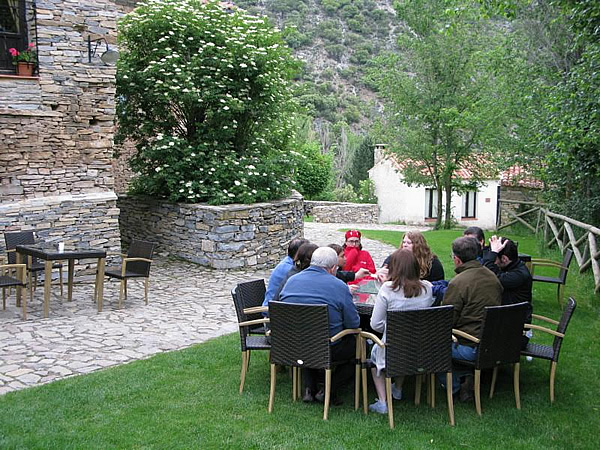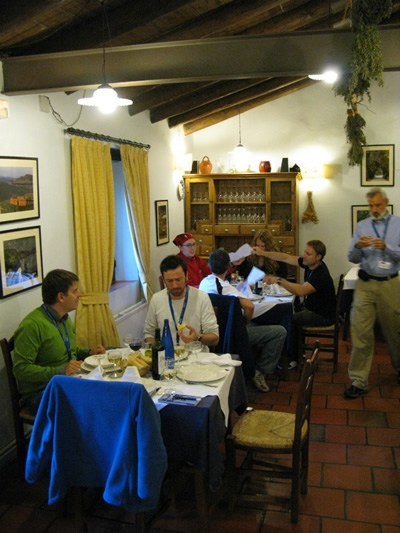Speak English? Volunteer in Spain!
Have all your expenses covered and
meet incredible people in Spain; all simply for being a
native English-speaker
Article and photos
by Nora
Dunn
 |
| The mixed Spanish and English
speakers participate in a unique relaxed program speaking
only English. |
What have I done? I wondered
when I realized that two of my three weeks in Spain was
to be spent in a remote restored village four hours from
Madrid…and that I wouldn’t even be allowed
to speak Spanish (a language I’m eager to learn). What
sort of cultural experience is that?! I berated myself.
In retrospect however, I realize this
program was the perfect way to meet many different people
from all over Spain (and the rest of the world). And I certainly
couldn’t argue with the price of the program either;
in fact, having all my expenses paid in exchange for conversational
English seemed too good to be true.
PuebloIngles
PuebloIngles (which was
called VaughanTown when I attended) is one of a few companies
dedicated to helping Spaniards improve their English skills.
English is very important to Spanish commerce and business,
so there is a booming market in English instruction throughout
Spain.
This program differs from simple English
classes though, in that Spanish participants are sent on
a 5-day retreat where they are required to do only one thing — to
speak English. Spanish participants are required to have
at least a basic knowledge of English so that the conversations
can flow relatively easily, since there is no grammar or
vocabulary instruction — just conversation.
Because English is important to Spain’s
economy, most of the Spanish program participants attend
these retreats on their company’s dime. A much smaller
contingent of participants are committed individuals or
post-secondary students for whom the program is incorporated
into their curriculum.
And the bill isn’t cheap either;
the program fee covers not only the Spaniard’s accommodation,
food, and transportation, but the expenses of the English
speakers well! English speakers are rewarded for volunteering
and committing a week to conversational English by having
all expenses paid during the retreat.
The Accommodation, the Food
Diverbo "Pueblo Ingles" operates
out of a few different locations around Spain. Accommodation
ranges from established hotels in small Spanish towns, to
restored villages that are taken over by the participants
and transformed into quaint “English” towns.
Each participant receives their own
room with an ensuite washroom, and most locations offer
some sort of internet connection and basic amenities. Some
accommodations offer luxuries like swimming pools and tennis
courts, while others are more basic but tap into the beauty
of being nestled in the mountains with miles of walking
tracks to enjoy.
Great effort is made to produce a well-rounded
menu, with a breakfast buffet, and 3-course lunches and
dinners. Wine is complimentary during lunch and dinner,
however additional drinks must be purchased at your own
expense.
Meals are relaxed, often taking about
an hour and a half to enjoy, but are not necessarily “breaks” from
the work of the day. Each table must have equal proportions
of Anglos and Spaniards, and the conversation never stops.
Luckily it is far from being a hardship, especially as the
week progresses.
 |
| English speakers and Spanish
enjoy meals together. |
The Schedule
On arriving from Madrid, the English
speakers meet the Spaniards (who have traveled from all
over the country) at an orientation session, where the week
is spelled out.
The master of ceremonies highlights
surprisingly few rules. Most important is that nobody speaks
Spanish; in fact if anybody is overheard speaking in Spanish
it is grounds for dismissal from the program. This is truly
an English-immersion program, and all participants are to
respect this primary requirement.
Beyond that, some guidelines are laid
out to help keep the week running smoothly; don’t
discuss politics or religion, stay away from the standard
repetitive cocktail party chat, and if you run out of things
to talk about, grab a “conversation card” for
some fresh ideas.
We are then shown our schedule for the
next few days: a grid that breaks down each hour of the
day. Breakfast is from 9-10 a.m., followed by four hours
of “one-to-one” sessions, where Anglos are
paired up with a different Spaniard each hour. You can do
anything you like during the one-to-one sessions as long
as you keep the conversation going; I enjoyed hiking the
nature trails during many of my one-to-one sessions.
Lunch is enjoyed from 2-3:30, followed
by free (siesta) time until 5 p.m. Everybody reconvenes
with a group activity at 5 p.m., then two more one-to-one
sessions begin at 6 p.m. At 8 p.m., a one hour variety-style
show is performed starring the Anglos and Spaniards themselves;
acting out short skits, performing in improvisation troupes,
and even showcasing their talents with a poetry reading,
song, or dance. Initially I thought these shows would be
awkward and poorly performed, but for the most part they
were the highlight of each day. If nothing else, they were
routinely hilarious—even if it was a language barrier
that made it so.
After a 9 p.m. dinner, participants
can do as they wish for the rest of the night. In the first
few days of the week, exhaustion sets in after a long day
of intensive conversation and most people go straight to
bed. But as the week progresses, friendships are forged,
and conversation flows easier, more people tend to stay
up and have a few drinks, play some cards, or even turn
on some music and start dancing.
During some of the one-to-one time slots,
extra activities are scheduled to incorporate variety and
additional learning opportunities for the Spaniards. These
activities include structured telephone conversations and
interviews (since understanding a foreign language over
the telephone can be quite difficult), conference calls,
and formal presentations. And if you are lucky enough to
be cast in the show for that night, you receive a few hours
of structured rehearsal time in lieu of one-to-ones.
On the last night there is no 8 p.m.
performance, and instead participants are given free time
to prepare for the final diner and ensuing party. By this
point in the week, most Spaniards’ English has improved
to the point where they don’t have to “think” as
much and conversations flow quite easily. There are some
strong friendships (and occasionally even a romance or two),
and the group easily parties through the wee hours of the
morning.
Being an English Speaker
There is a concerted effort on the part
of the program coordinator to ensure a wide representation
of English speaks from all over the world with different
accents, ages, backgrounds, and careers. As such, there
is a formal application process for English Speakers to
qualify for the program. Most importantly, the English speakers
must demonstrate a general love of people and conversation,
since it’s your conversational skills that make or
break your ability to enjoy the week and provide value for
the Spaniards.
Don’t worry however, if you can’t
think of conversational topics off the top of your head.
I wondered what on earth I would be able to speak about
before I arrived, and was consistently pleasantly surprised
at how quickly an hour passed in the company of a Spaniard
I had only just met. Rarely did I broach the same conversation
topic more than once, even with different people.
Volunteering: The Cultural Experience,
the Friendships
After my first week of volunteering,
I had made an amazing number of new friends. Despite my
initial reservations about being culturally isolated on
the program, there was in fact no other way I could have
met so many different Spaniards from all over the country
and had a chance to have meaningful conversations with them.
These people don’t work in hospitality or tourism,
or in any other way that I as a traveler could meet them.
In getting to know all these “regular” people,
I learned so much more about life in Spain than I could
have imagined was possible.
So strong were some of the friendships
forged with Spaniards that I stayed with one woman and her
family following my first volunteer week, and after my second
week of volunteering I stayed with another family for a
few days. In addition, I have a small list of people to
stay with around the country when I return to Spain. (And
I will).
I also connected with a number of the
English speakers from a wide variety of countries. I stayed
with a few in Ireland and England, and enjoyed some day-trips
around Spain with some others.
Saying Goodbye
Saying goodbye is difficult. Photos
and email addresses are exchanged, with promises to keep
in touch and hugs doled out all around. We marvel at how
quickly the group solidified and became friendly, and we
reflect on the intensity of the program as being the breeding
ground for what we hope will be many long-standing friendships.
Although few Spaniards may repeat
the immersion program, one thought for many of the English
speakers is: I wonder when I can come back.
For More Information
PuebloIngles now
is the major company in Spain operating such a
unique volunteer language program. Locations are
subject to change, so please see the website below
for current options. Also see the website below
for any other updates and extensive details along
with FAQs, as the program that was called VaughTown
when I attended it has undergone a few changes,
though the core experience is very similar.
PuebloIngles conducts many such volunteeer
programs in different locations around Spain.
It also has programs for teens.
|
Nora
Dunn became The
Professional Hobo after selling everything
she owned to travel the world in 2007. She travels
full-time in a financially sustainable manner,
enabled in part by volunteering in trade for accommodation.
|
